 Downloads
Downloads
REPORT OF THE PUBLIC HEARING ON THE BILL FOR…
18 July, 2018.
In commemorating the Rome Statute, Nigerian Coalition for the International Criminal Court (NCICC) partnered with the The House of Representative Committee on Treaties, Protocol and Agreements and held a public hearing on the Bill for “An Act to provide for the Enforcement and Punishment of Crimes Against Humanity, War Crimes, Genocide And For Other Related Offences”.
The meeting took place on the 18 July, 2018 at the National Assembly Complex and had in attendance the Honourable Chairman and deputy Honourable Chairman of the House Committee on Treaties, Protocols and Agreements, Honourable Members of the House of Representative, members of the Nigerian Coalition for the International Criminal Court as well as members of the general public.
The aim of the meeting was to get recommendations and contributions from stakeholders to assist the House Committee in producing a report for the third reading and adoption of the Bill by the National Assembly.
In his opening remark the Chairman of the committee stated that the Bill is in line with sections of the 1999 constitution of the Federal Republic of Nigeria, and that there was a need to domesticate the International Conventions and Treaties contained in the Rome Statute through the legislation of the National Assembly in order to give effect to the laws contained in the Statute. He further explained that certain provisions of the Rome Statute of the International Criminal Court which Nigeria became signatory to in 2001 have not been implemented due to the lack of its domestication as required by the constitution. He concluded his opening remarks by stating that the public hearing will create a platform for stakeholders to make strong recommendations and contribution that will help in pushing the bill to the Upper House of Legislature and ensure the smooth passing of the Bill into law.
Professor of law, Professor Agbo Madaiki in delivering his presentation stated that Public hearing on the Bill to domesticate the Rome Statute could not be coming at a more auspicious time as Nigeria appears to be at the Rubicon and finds it near impossible to go forward or go backward as the stark reality of the senseless killings of thousands of innocent Nigerians is carried out with impunity.
Prof. Madaiki also noted that;
The punishment Clauses recommends the same penalty for similar offences under the Penal Code and Criminal Code, which is the death penalty. He stated that the death penalty has no utilitarian advantage over terms of imprisonment or a life sentence, he recommended Life Imprisonment instead especially being that the Convention against Torture and other Cruel, Inhuman and Degrading Treatment abolished the death penalty. He also said that the prescribed penalty for offences contained in clauses 10, 11, 12 and 14 which is a term of imprisonment of two year is too liberal and mild.
He further went on to say that Clause 17 [3] of the Statute which 2
state that it is not a defence for a person charged with an offence to plead that the act constituting the offence was committed in obedience to the law in force at the time of the commission of the offence clearly violates Section 36[8] of the Constitution which states that no person shall be held guilty of a criminal offence on any account of an act or omission that did not at the time it took place, constitute such an offence. He concluded by stating that the Bill when passed into law will achieve two objectives which is safeguarding higher values such as the protection of human rights and ensuring the accountability of those responsible for the commission of internal crimes in and outside Nigeria.
The Sponsor of the Bill, Honourable Nicholas Ossai represented by his Senior Special Assistant,Barr. Chris Agidy, giving a synopsis of the Bill stated that the aim of the Bill is to provide a formation for the enforcement and punishment of the international crimes and that domestication of the Rome Statute provides a network of corporation between Nigeria and the International Criminal Court to ensure the effective prosecution of international crimes committed in Nigeria or outside Nigeria, and also provides special victims trust fund to assist victims and survivors of international crimes in Nigeria which should be overseen by the National Assembly. He concluded by appealing to the Committee Chairman and other members of the House to ensure that the Bill is given a smooth passage.
Mr. John Ozoeri representing the President of the Nigerian Bar Association, in his presentation stated that the importance of domesticating the Bill into our municipal laws cannot be overemphasized because the National courts are the only place where a common man can go to get justice, he added that the domestication of the Bill will therefore give hope to victims and Nigerians to go to court for the enforcement of their rights and applauded the efforts of the sponsor of the bill and the Honourable House of Representative for having successfully completed the first and second reading of the Bill and hopes that the Bill will see the light of the day.
Dr. Martin Ejidike, Senior Human Rights Adviser to the United Nations Resident Coordinator, during his presentation stated that the ICC is created by the international committee of states, to investigate, prosecute and try individuals for the international crimes of Genocide, Crimes against humanity, war crimes and Crime of aggression. He added that the ICC is complementary to national criminal jurisdiction to ensure that perpetrators of war crimes and crimes against humanity are prosecuted accordingly. He noted that the ICC prosecutes international crimes only when the state concern is genuinely unable or unwilling to prosecute them. He went further to say that when Nigeria ratified the Rome Statute in 2001 a rapid implementation was expected but this was not to be as there have so far been three failed attempts to domesticate the treaty and hopes that this public hearing will achieve the desired response. He reiterated on the importance of the domestication of the Bill which he said will give credence to the strong support Nigeria offered to counter efforts within the African Union to secure a general withdrawal from the ICC. He further stated that Nigeria owes a constitution and treaty responsibility to domesticate the Rome Statute and it is hoped that the public hearing will also aid the fulfillment of this constitutional responsibility.
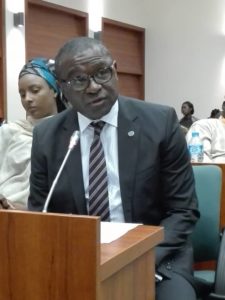
Dr. Martin noted that the President of Nigeria in his preliminary address on the occasion of the 20th anniversary of the Rome Statute in the Hague urged states that are yet to sign the Rome statute to do so as a matter of deliberate state policy, he then pointed out that is therefore only expected that Nigeria will do its part by domesticating the treaty and concluded by saying that Nigeria should also be persuaded on the need for domestication by the fact that the current president of the ICC is a worthy son of Nigeria and added that it will also be a worthy 20th anniversary present to the ICC during the presidency of a son of Nigeria. He stated further that as Nigeria prepare for the elections in 2019 it is prudent that Nigeria concludes the domestication of the statute in other to put trouble maker as to what awaits. He urged the House of Representative and the Nigerian government to give the Bill the utmost attention it needs.
Mr. Daniel from Access to Justice stated that under the Bill, the Attorney General of the Federation is saddled with the responsibility of acting on behalf of the Federal Republic of Nigeria in respect of all obligations imposed on state parties by the Rome statute and the procurement of the consent of the Attorney General is a pre-condition to the commencement of action against persons who commit international crimes of the nature outlined in the Rome Statute. He however stated that, if that provision is retained, there will be very little chance that prosecutions for violation of the ICC Statute will likely take place and most likely actions that are taken to secure some political advantage for a government in power will never be questioned. He stated further that the proposed legislation undermines itself by making the consent of the Attorney General a prerequisite for the institution of action against persons suspected of committing international crimes. He concluded by saying that even though he is unable to proffer the best of solutions to the problems he has highlighted, suggestion can be made that the Bill could contain provisions to the effect that where the Attorney General fails to give consent to a proposed prosecution, other institutions could review his decision or commence action on his behalf. He also suggested that in the event of the Attorney General refusing to prosecute, the rationale behind his refusal should be disclosed and made the subject of review by a impartial body possibly a judicial one.
Mr. Benson Olugbo of Cleen Foundation, in his presentation stated that under article 17 of the Rome Statute which provides for the principle of complimentarity, it states that the jurisdiction of the international criminal court will only be activated if the national courts are unable to do so. He also pointed out that the punishment in section 11-14 which talks about corruption should be increased from two years otherwise offenders will be encouraged to continue. He further stated that the section in the Bill which gives the Attorney General the power to give consent before prosecution should be expunged and instead the DPP be given that responsibility being that the attorney general is a political appointment and the DPP is a career civil servant. He further talked about Article 93 which provides for a Victims Trust Fund and noted that we already have a Victims Trust Fund in Nigeria, He also aligned with previous speakers that the death sentence in Section4(2)(b) be looked into as Nigeria is gradually moving away from death sentences. He concluded with saying Section 3 of the Bill which makes mention of trial of offenders in absentia should also be looked into as the Nigeria Judicial system does not recognise trial in absentia.
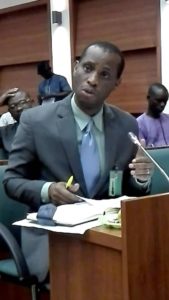
Mr. Olaniyi Omodara from the National Human Rights Commission commended the National Assembly and the Committee for this laudable task and noted that the passage of the Bill into law will further enhance the enjoyment of human rights in Nigeria. He observed that there were some typographical errors in the Bill which if not properly corrected may give a different meaning to the intentions of the legislators, he stated that the punishment of 30years sentencing as contained in the Bill for where death occurs by accident is outrageous and asked that the term of 30years be reviewed but in situations where the crimes are committed intentionally then the death penalty contained Penal Code and the Criminal Code may apply. He commented on the sections provided for punishment and on whether the terms of punishment is commensurate to the offences mentioned, he stated that the purpose of imprisonment is not to punish but to reform and to bring people back to the society as better citizens
Professor Joy Ezielo in her speech stated that the Bill ensures that human rights and humanitarian law is not contradictory to criminal justice system .She noted that there are some definition lapses in the Bill i.e there is no specific definition of what constitute crimes against humanity, there is also no definition of trafficking of persons or rape, she pointed out that the meaning of torture as contained in the Bill has to come within the UN Convention against Torture.
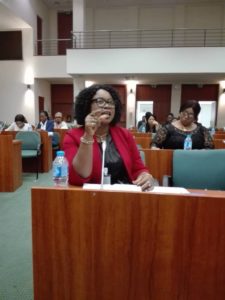
On the issue of Accountability- She stated that sometimes the problem in Nigeria isn’t just lack of laws but lack administration of criminal justice, she pointed out that in as much as punishment has to be proportionate and is also meant to serve as a deterrent she is of the opinion that there shouldn’t be a minimum sentencing for punishment.
On the issue of Victims of survivors-she stated that there should be a mechanism put in place for protection of victims which will also help the rehabilitation and redress of these victims.
Mrs. Chinyere Efobi ,Legal Adviser to the Nigerian Institute of International Affairs talked about Part IV Section 22(2) which confers jurisdiction on the State High court, she stated that it will be best if the Federal High Court can be conferred with absolute jurisdiction to try offence under that section as the Federal High Court exercises jurisdiction over every state in Nigeria, also being that only the DPP prosecutes after the Attorney General gives his consent under the Bill it is only advisable that the Federal High Court exercises absolute jurisdiction as the DPP prosecutes mostly in the Federal High Court.
Mr. Voke Ighorodjie from Reeds Center stated that we have a collective responsibility to see to the smooth passage of the Bill, in his brief statement he stated that impunity has become the norm in the society, the Bill is to therefore foster accountability and deterrence. He reiterated the need to ensure the Bill is passed into law before the election fever begins and also with a son of Nigeria being the president of the ICC.
Mr. Segun Jegede spoke on the issue regarding the jurisdiction of the High Court and the Federal High Court, and stated that a special court should be created to try international crimes to avoid situations of conflicting decisions being reached by the different court. He further stated that a witness protection system should be put in place.
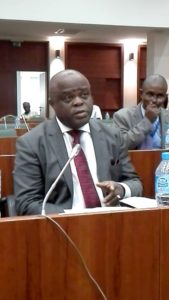
Deputy Minority Speaker, Chukwuka Onyema Wilfred, representing the Speaker of the House of Representative in his statement stated that the Bill will give effect to the provisions of right to life in section 33 of the Constitution of the Federal Republic of Nigeria. He stated that the contributions from stakeholders present will go a long way in helping the Bill scale through and urged everyone to put all hands on deck.
The Chairman of the Committee in his speech stated that the criminal offences of genocide, crimes against humanity and war crimes are requisite part of domestic legislation where a state wishes to prosecute persons for atrocities committed in the course of conflict. He added that these offences have been long recognised as crimes under international law but have not been incorporated into National Legislation, he went further to say that the referral of the bill to the committee for further legislative action is a clear indication of the firm resolve of the house to faithfully implement its legislative Agenda and social contract with their constituents. He concluded by commending the House of Representatives under the leadership of Rt. Hon. Yakubu Dogara for his proactive efforts and commitment in effecting legislations that will directly impact on the security life of all citizens as guaranteed in the constitution. He assured everyone that the committee is open to any idea from stakeholders and will appreciate and critically examine every input and recommended ideas that will be of benefit to the Nigerian people.

Mr.Joel Agah,a member of the NCICC in his brief speech stated that when the community captures the perpetrators of these crimes and hand them over to security agents nothing is heard of it anymore, he insisted that this is so because the security agency protects the offenders and stated that there should be no protection for offenders.
The Chairman of the Nigerian Coalition for the International Criminal Court, Mr. Chinonye Obiagwu in giving the final speech for the day stated the NCICC is ready to assist the committee in preparing its reports, he stated that there is a gender and technical unit within the NASS which can assist the committee in putting down everything said in this meeting and also resource persons from the NCICC that can be of great assistance, speaking on the provisions of the Bill he stated that there is a need to harmonize the Bill with other existing laws to avoid conflicts and there should be a cross reference between laws. He also pointed out that the definition of torture in the Bill be revised to reflect the definition of torture as contained in the Torture Act.
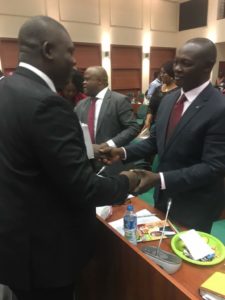
On the issue of sentencing he stated that rather than putting minimum sentencing for punishments maximum sentencing should be used.
Speaking on Section 93 of the Bill which speaks of establishment of Victims Trust Fund, Mr. Obiagwu opined that the Victims Trust Fund should be a creation of statute so that report on it can be made directly to the National Assembly, he also stated that the government should take advantage of section 93 of the Bill and include social funds which most times go unaccounted into the Victims Trust Funds.
Lastly on the issue of Jurisdiction, he stated that the State High Courts and the Federal High Court be allowed to have jurisdiction to try the offences as the Act which provides for the definition of crime included both the State High Courts and the Federal High Courts. He stated also that offences committed in the states can be tried in the States High Courts and offences to be prosecuted by the Federal High Court can as well be tried by the Federal High Court.
In conclusion he thanked the Committee once again and reiterated his support for the Bill he added if any assistance from the United Nations is needed, Dr. Martin Ejidike from the United Nations will be available to render such support.